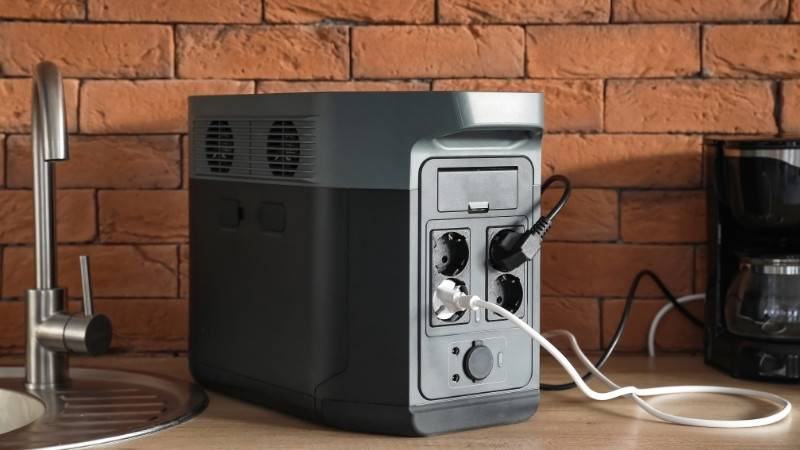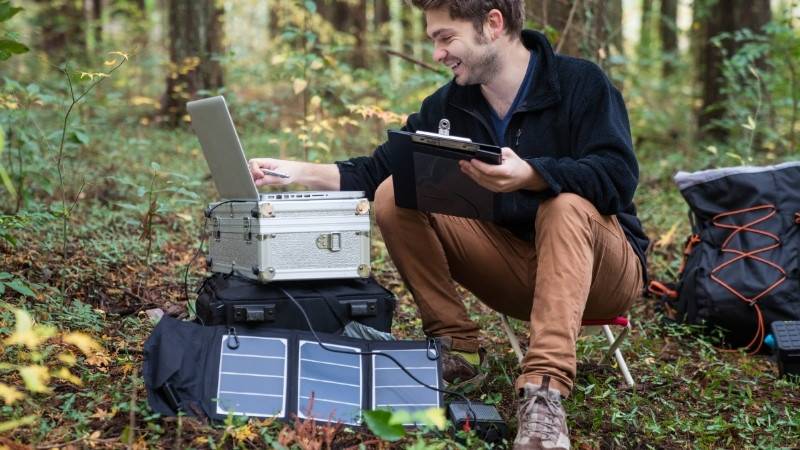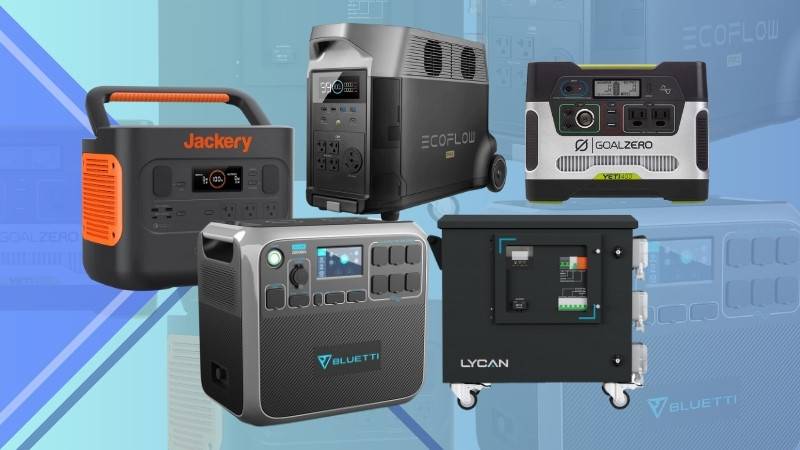So, you’re considering going solar and investing in a solar generator for your home?
That’s fantastic!
Solar generators offer an eco-friendly and efficient alternative to traditional gas generators. They even offer numerous benefits like low maintenance and quiet operation.
Read on to discover the ins and outs of solar generators, including how does a solar generator work.
Key Takeaways
- Solar generators are a reliable, eco-friendly off-grid energy source composed of components that convert sunlight into usable electricity.
- When selecting the ideal solar generator model for your needs, consider factors such as power output, battery capacity, and charging time to maximize efficiency.
- Regular maintenance is necessary to ensure optimal performance and longevity. Including regular care of the battery and cleaning/inspection of panels.
How Does a Solar Generator Work: Understanding The Fundamentals
Solar generators are energy-producing devices that utilize sunlight to generate electricity, providing a reliable source of off-grid energy.
They are becoming increasingly popular for their ability to reduce power bills, lower carbon footprints, and promote sustainable living. But how do solar generators work, and what makes them a better choice compared to traditional gas-powered generators?
Solar generators are composed of several key components that work together to convert sunlight into usable electricity. In the following subsections, we will explore these components and the process of converting sunlight to electricity.
Components of a Solar Generator
A solar generator consists of —
- Solar panels
- A charge controller
- An inverter
- A battery
Solar panels absorb the sunlight and transform it into direct current (DC) electricity. This DC electricity is then routed to the charge controller. The charge controller regulates the flow of electricity to the battery, preventing overcharging and ensuring the longevity of the battery.
The inverter plays a crucial role in converting the DC output from the battery into alternating current (AC), which is suitable for powering household appliances.
Lithium-ion batteries are the preferred choice for solar generators due to their lighter weight, longer lifespan, and compact size compared to lead-acid batteries.
The Process of Converting Sunlight to Electricity
Now, let’s tackle how these components work together to convert sunlight into electricity — a process called the photovoltaic effect.
Think of it as an elegantly choreographed dance.
Here’s the breakdown:
- The solar panels absorb sunlight, exciting the electrons in the photovoltaic cells. This excitement generates direct current (DC) electricity.
- This electricity is then sent to the charge controller, which regulates the flow of electricity and prevents overcharging of the battery.
- The battery stores the electricity until it is needed, ensuring a consistent supply of power even during nighttime or cloudy weather.
- Most of our home appliances use alternating current (AC). So, when you need to use electricity, an inverter in the system converts the DC power from the battery into AC power.
Solar backup generators are particularly advantageous in comparison to gas and diesel-powered generators. They operate silently and produce no carbon dioxide emissions, allowing for indoor use.
Types of Solar Generators

Broadly speaking, solar generators can be classified into two types based on their portability:
- Portable Solar Generators
- Permanent Solar Generators
Portable solar generators are designed for outdoor activities such as camping, boating, and emergencies.
On the other hand, permanent solar backup generators are installed in homes to provide a continuous power supply during power outages.
Each type has its benefits and drawbacks, which we’ll explore in more detail below.
Deciding between portable and permanent solar generators will largely depend on your specific power requirements, budget, and lifestyle.
In the following subsections, we’ll delve into the specifics of each type.
Portable Solar Generators
Portable solar generators are lightweight and designed to provide power for leisure travels, RV trips, and other activities. Jackery Explorer 500 is a great example in this case.
USB ports, AC outlets, and 12-volt carports are some of the features that these chargers typically have. With these inbuilt amenities, you can charge multiple devices at once.
However, they have limited power capacity and can take longer to recharge compared to traditional generators.
Despite these limitations, solar-powered generators, also known as portable solar generators, offer greater portability and flexibility than traditional gas generators.
They are an ideal choice for outdoor enthusiasts, emergency preparedness kits, and anyone in need of a reliable, eco-friendly power source on the go.
Permanent Solar Backup Generators
Permanent solar backup generators are installed in a fixed location to provide backup power to a home or business during power outages.
They are efficient, quiet, and have the capacity to power essential appliances and devices for an extended period of time. Tesla Powerwall is a great example of such a generator.
However, they can be quite heavy, making them less suitable for portable use. Also, you’d require professional installation and a considerable upfront investment.
For those looking to invest in a reliable, eco-friendly backup power solution for their home or business, a permanent solar backup generator can be an excellent choice.
Despite the negatives, the long-term benefits of lower maintenance costs and reduced carbon emissions make them a worthwhile investment.
Solar Power Generator Efficiency and Charging Time
Solar generators’ performance can be influenced by several factors. Let’s first explore what can impact their efficiency.
Factors Influencing Efficiency
- Quality of Components: A solar generator's efficiency heavily depends on its components' quality. High-quality solar panels and batteries can capture and store more energy, leading to better performance.
- Weather Conditions: As you might guess, sunny weather leads to higher efficiency because solar panels can absorb more sunlight. Overcast conditions can limit the energy your solar generator produces.
- Placement of Panels: The location and angle of your solar panels can significantly affect efficiency. Ideally, panels should face the sun and not be shaded by trees or buildings.
- System Maintenance: Regular maintenance, such as cleaning the solar panels and checking the system's wiring, can ensure your generator runs at its best.
By considering these factors, you can select the most efficient solar generator for your specific needs and location.
Charging Time Considerations

When selecting a solar generator, it’s essential to consider the charging times of various models.
Charging times can be influenced by factors such as the size and efficiency of the solar panels, the battery capacity, and the amount of sunlight available.
A larger solar panel made for homes will charge a battery faster, but keep in mind that this also depends on the strength of the sunlight. In other words, the generator will charge faster on a bright summer day compared to a cloudy winter day.
Finally, remember that while a larger battery can store more power, charging takes longer. It’s all about finding the right balance based on your energy needs.
Comparing Solar Generators to Gas Generators
When comparing solar generators to traditional gas generators, it’s important to consider the advantages and disadvantages of each type.
Solar generators are environmentally friendly, quiet, and require minimal maintenance. However, gas generators are often more affordable and provide a higher power output.
To help you make an informed decision, let’s look at the advantages and disadvantages of solar generators.
Advantages of Solar Generators
- Eco-Friendly: Unlike gas generators, solar generators produce power without emitting harmful pollutants. They're a cleaner, greener option that harnesses the power of the sun — a renewable and abundant energy source.
- Quiet Operation: Solar generators work silently, a stark contrast to the noisy operation of gas generators. This quiet performance makes them ideal for home or outdoor adventures like camping trips.
- Low Maintenance: With fewer moving parts, solar generators require less maintenance compared to gas generators. No need to worry about oil changes or engine servicing.
- Operational Cost: After the initial investment, solar generators' operational cost is practically zero since sunlight is free. In contrast, gas generators have ongoing fuel costs.
Disadvantages of Solar Generators
- Dependent on Weather: The efficiency of solar generators can be affected by weather conditions. They perform best under direct sunlight, while their power output can decrease on cloudy or rainy days.
- Higher Initial Cost: Solar generators can be more expensive to purchase initially compared to gas generators. However, they can be more cost-effective in the long run due to lower operational costs.
- Charging Time: Depending on the model and sunlight conditions, solar generators can take several hours to charge fully.
Choosing the Right Solar Generator for Your Needs

Selecting the right solar generator for your needs involves carefully considering —
- Your power requirements
- The size and weight of the generator
- The number of charging ports available
Basically, you need to assess your energy needs and research the top brands and models on the market. This will help you find the best solar generator for your specific requirements.
Assessing Energy Requirements
First, you need to determine your energy needs. Make a list of the devices and appliances you plan to power with the solar generator and tally up their total wattage.
This will give you an estimate of the generator’s size and the battery capacity you need. Remember, if you plan to use the generator for backup power during outages, factor in the essential appliances you’d need to run in such scenarios.
At the same time, consider your intended use case. This can help you look for specific features that you may need, such as rapid charging or a wireless charging pad.
Comparing Top Brands and Models
Once you’ve established your energy requirements, it’s time to shop around. Compare different brands and models in terms of their power output, battery capacity, portability, durability, and price.
Check out user reviews and ratings to gauge customer satisfaction and the product’s performance in real-world conditions. Brands like Jackery, Goal Zero Yeti, Bluetti, Renogy, and EcoFlow have a reputation for quality solar generators.
But it’s always worth exploring other options to find the perfect match for your needs.
Tips for Proper Solar Generator Maintenance
While solar generators generally require less maintenance than their gas-powered counterparts, proper care can extend their life and ensure they function optimally.
Here are some tips:
Battery Care and Replacement
Proper care and timely replacement of your solar generator’s battery are essential for ensuring its long-term performance.
To avoid overcharging the battery, make sure to use a charge controller that regulates the flow of electricity and prevents damage to the battery.
Additionally, recharging the battery every couple of months if it’s unplugged to maintain its optimal performance is important. By taking care of your solar generator’s battery, you can ensure the longevity and efficiency of your solar generator.
Cleaning and Inspecting Solar Panels

Regular cleaning and inspection of your solar generator’s panels are crucial for maintaining their efficiency and preventing damage.
Clean the panels manually with a garden hose and a soft sponge, using a mild detergent if necessary to avoid abrasive damage.
You should also inspect them for signs of wear and tear, such as cracks or corrosion. By conducting regular maintenance on your solar generator, you can ensure its optimal performance and prolong its lifespan.
Follow the Manufacturer’s Instructions
Every solar generator is a bit different. Always follow the specific maintenance guidelines provided by the manufacturer to ensure your generator stays in top shape.
Final Words
So, there you have it — a comprehensive look at how solar generators work.
As a renewable energy source, solar generators present an eco-friendly, quiet, and low-maintenance power solution for a variety of applications, from camping trips to home backup systems.
Investing in one not only means securing a reliable power source but also taking a step towards a more sustainable and environmentally conscious lifestyle.
Here’s to harnessing the sun’s power for a brighter, greener future!
Frequently Asked Questions (FAQ)
Yes, a solar generator can power a house depending on its size and energy consumption. It typically includes photovoltaic solar panels, an inverter, a solar battery, and other components.
A solar generator with a fully charged battery can run for approximately one year.
Solar-powered generators come with several drawbacks, such as slow charging times, limited power capacity, and reliance on sunlight. This makes them a less than ideal choice for larger-scale energy needs.
It is possible to run a solar generator continuously with enough sunlight and battery storage capacity as long as its ability to generate and store electricity exceeds the consumption of the equipment.
A solar generator typically consists of solar panels, a charge controller, an inverter, and a battery, providing a reliable source of renewable energy.

